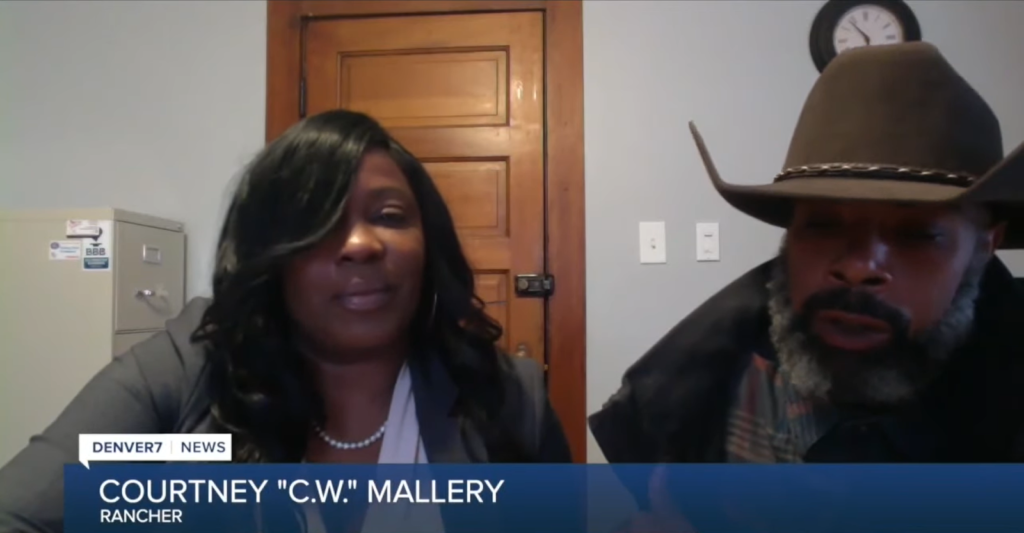Courtney Mallery’s Arrest: A Detailed Overview
Courtney Wayne Mallery, an African American rancher in El Paso County, who reportedly claimed racially motivated harassment from his white neighbors and the sheriff’s department, was arrested recently. On February 6th, he was taken into custody by the Colorado State Patrol and later transferred to the El Paso County Jail, as confirmed by a CSP representative.
The arrest was recorded and posted on Instagram by Mallery’s wife, Nicole, under the account @blackfarmlandownersmatter. The video has since then gained extensive online traction. Despite originally being detained without bond, the following day, a county judge set Mallery’s bail at $6,000.
Mallery faced charges of felony stalking, tampering with a utility meter (a misdemeanor), and theft under $50 (a petty offense). Nicole Mallery, who also had an outstanding warrant for her arrest, turned herself into police in a different county, as stated by Sergeant Jason Garrett, a public information officer for EPCSO. However, she was not detained by or in the custody of EPCSO.
Mallery’s Allegations Against White Neighbors
The Mallerys were featured in a January article by the Ark Republic, in which they claimed racial harassment from white neighbors who were reportedly killing their livestock and attempting to remove them from their property, Freedom Acres Ranch. The article included allegations that EPCSO Sergeant Ray Gerhart, of the Rural Enforcement and Outreach Unit, was complicit in the racial discrimination aimed at displacing his family.
In December, both Mallerys had a warrant out for their arrest for stalking, tampering with a utility meter, and petty theft.
Support for the Mallery
On February 6th, the Rocky Mountain NAACP voiced their support for the Mallerys outside the El Paso County Jail. The organization’s president, Portia Prescott, also shared a video with Nicole Mallery on social media. However, Prescott has not responded to media inquiries for further comment.
EPCSO’s Response

EPCSO categorically denied the accusations of racial discrimination by its officers. In response to the Ark Republic article, EPCSO stated that it felt compelled to share additional details as the article garnered significant attention at a time of strained relationships between law enforcement agencies and their communities.
- The Ark Republic, on the other hand, affirmed that EPCSO was contacted for their comments before publishing the article;
- EPCSO’s statement stressed that it had conducted thorough investigations into 19 complaints made by or involving the Mallerys;
- Moreover, it mentioned responding to over 170 calls for service related to the Mallerys.
Reaching out for Resolution
Sheriff Joe Roybal reached out to Willie Breazell, a co-founder and cabinet member of the Black and Latino Leadership Coalition of Colorado Springs, proposing a meeting with the Mallerys and EPCSO officials. The proposal also hinted at facilitating a diverse panel addressing concerns not only of the Mallerys but also of the broader community regarding the alleged attacks on Black farmers in eastern El Paso County.
Breazell has expressed concern that the situation might turn violent due to harsh online dialogues. Some social media comments hint at people willing to arm themselves to protect Mallery’s land. Breazell iterated his willingness to help defuse the situation, stressing the importance of resolving the issue rather than allowing it to fester, which could lead to volatile, dangerous consequences.
Community Response & Threats
According to Lieutenant Deborah Mynatt, an EPCSO public information officer, the office received numerous threats via public email and phone lines in relation to the Ark Republic article. However, Roybal’s request for a meeting was motivated by a desire to bring about resolution amongst the Mallerys and the broader Black community, rather than as a safety precaution.
Depending on the interests of the involved parties, the proposed panel could be public or private. EPCSO promised to keep the community updated on the developments.
Implications for Black Farmers in Eastern El Paso County
This situation could potentially have far-reaching effects on the experiences of Black farmers in eastern El Paso County. Discrimination, harassment, and threats against Black farmers are pressing concerns that need addressing. The unfolding story of the Mallerys provides a stark reminder of the racial tensions that persist in some American communities. Giving attention to such issues is critical for a more inclusive and equitable society.
Courtney Mallery: Next Steps
As the situation unfolds, it will be interesting to watch how the Mallerys and their supporters respond to further developments and whether the proposed meeting with EPCSO officials will take place. The broader community will undoubtedly monitor the actions of EPCSO, the response of the Mallerys, and the ripple effects this has on Black farmers in the area.
Conclusions
The case of Courtney Mallery highlights the intersection of race, property rights, and community dynamics in modern America. As the situation unfolds, we aspire to see a fair and peaceful resolution, aiming for improved race relations and community harmony. This case has broad implications not just for Mallery and his family, but also for communities nationwide facing similar challenges.
In essence, Courtney Mallery’s situation reflects the ongoing racial tensions and community dynamics in the United States. This case impacts not only Mallery’s family but also has significant implications for other communities dealing with similar issues. As developments continue, we hope for a resolution that prioritizes justice and unity, with active involvement from communities and law enforcement. Measures like the proposed panel could play a crucial role in addressing the underlying issues at hand.